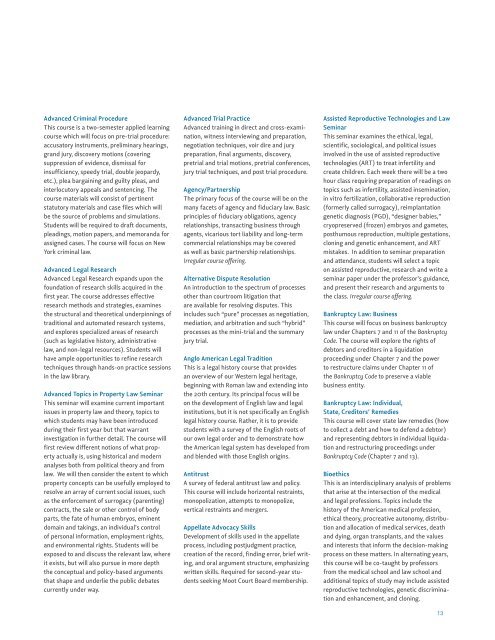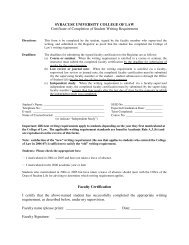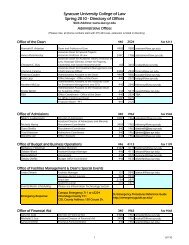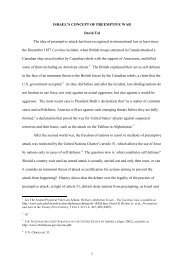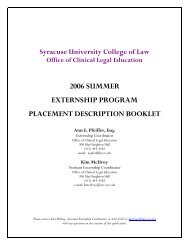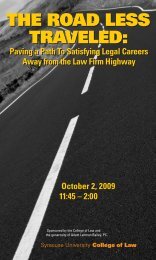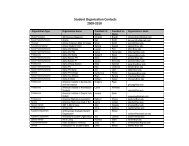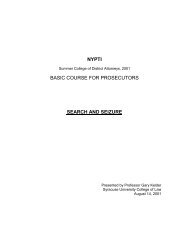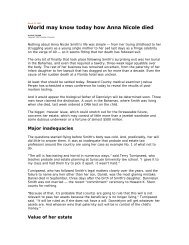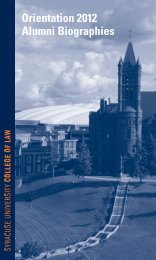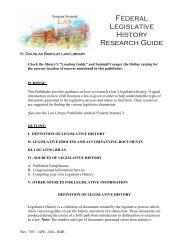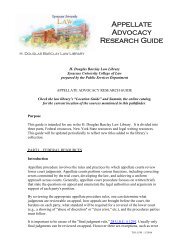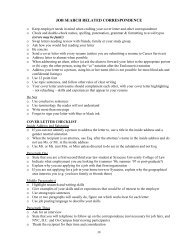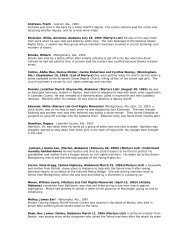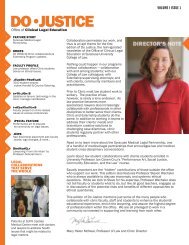CATALOG 2006-2007 - Syracuse University College of Law
CATALOG 2006-2007 - Syracuse University College of Law
CATALOG 2006-2007 - Syracuse University College of Law
Create successful ePaper yourself
Turn your PDF publications into a flip-book with our unique Google optimized e-Paper software.
Advanced Criminal Procedure<br />
This course is a two-semester applied learning<br />
course which will focus on pre-trial procedure:<br />
accusatory instruments, preliminary hearings,<br />
grand jury, discovery motions (covering<br />
suppression <strong>of</strong> evidence, dismissal for<br />
insufficiency, speedy trial, double jeopardy,<br />
etc.), plea bargaining and guilty pleas, and<br />
interlocutory appeals and sentencing. The<br />
course materials will consist <strong>of</strong> pertinent<br />
statutory materials and case files which will<br />
be the source <strong>of</strong> problems and simulations.<br />
Students will be required to draft documents,<br />
pleadings, motion papers, and memoranda for<br />
assigned cases. The course will focus on New<br />
York criminal law.<br />
Advanced Legal Research<br />
Advanced Legal Research expands upon the<br />
foundation <strong>of</strong> research skills acquired in the<br />
first year. The course addresses effective<br />
research methods and strategies, examines<br />
the structural and theoretical underpinnings <strong>of</strong><br />
traditional and automated research systems,<br />
and explores specialized areas <strong>of</strong> research<br />
(such as legislative history, administrative<br />
law, and non-legal resources). Students will<br />
have ample opportunities to refine research<br />
techniques through hands-on practice sessions<br />
in the law library.<br />
Advanced Topics in Property <strong>Law</strong> Seminar<br />
This seminar will examine current important<br />
issues in property law and theory, topics to<br />
which students may have been introduced<br />
during their first year but that warrant<br />
investigation in further detail. The course will<br />
first review different notions <strong>of</strong> what property<br />
actually is, using historical and modern<br />
analyses both from political theory and from<br />
law. We will then consider the extent to which<br />
property concepts can be usefully employed to<br />
resolve an array <strong>of</strong> current social issues, such<br />
as the enforcement <strong>of</strong> surrogacy (parenting)<br />
contracts, the sale or other control <strong>of</strong> body<br />
parts, the fate <strong>of</strong> human embryos, eminent<br />
domain and takings, an individual’s control<br />
<strong>of</strong> personal information, employment rights,<br />
and environmental rights. Students will be<br />
exposed to and discuss the relevant law, where<br />
it exists, but will also pursue in more depth<br />
the conceptual and policy-based arguments<br />
that shape and underlie the public debates<br />
currently under way.<br />
Advanced Trial Practice<br />
Advanced training in direct and cross-examination,<br />
witness interviewing and preparation,<br />
negotiation techniques, voir dire and jury<br />
preparation, final arguments, discovery,<br />
pretrial and trial motions, pretrial conferences,<br />
jury trial techniques, and post trial procedure.<br />
Agency/Partnership<br />
The primary focus <strong>of</strong> the course will be on the<br />
many facets <strong>of</strong> agency and fiduciary law. Basic<br />
principles <strong>of</strong> fiduciary obligations, agency<br />
relationships, transacting business through<br />
agents, vicarious tort liability and long-term<br />
commercial relationships may be covered<br />
as well as basic partnership relationships.<br />
Irregular course <strong>of</strong>fering.<br />
Alternative Dispute Resolution<br />
An introduction to the spectrum <strong>of</strong> processes<br />
other than courtroom litigation that<br />
are available for resolving disputes. This<br />
includes such “pure” processes as negotiation,<br />
mediation, and arbitration and such “hybrid”<br />
processes as the mini-trial and the summary<br />
jury trial.<br />
Anglo American Legal Tradition<br />
This is a legal history course that provides<br />
an overview <strong>of</strong> our Western legal heritage,<br />
beginning with Roman law and extending into<br />
the 20th century. Its principal focus will be<br />
on the development <strong>of</strong> English law and legal<br />
institutions, but it is not specifically an English<br />
legal history course. Rather, it is to provide<br />
students with a survey <strong>of</strong> the English roots <strong>of</strong><br />
our own legal order and to demonstrate how<br />
the American legal system has developed from<br />
and blended with those English origins.<br />
Antitrust<br />
A survey <strong>of</strong> federal antitrust law and policy.<br />
This course will include horizontal restraints,<br />
monopolization, attempts to monopolize,<br />
vertical restraints and mergers.<br />
Appellate Advocacy Skills<br />
Development <strong>of</strong> skills used in the appellate<br />
process, including postjudgment practice,<br />
creation <strong>of</strong> the record, finding error, brief writing,<br />
and oral argument structure, emphasizing<br />
written skills. Required for second-year students<br />
seeking Moot Court Board membership.<br />
Assisted Reproductive Technologies and <strong>Law</strong><br />
Seminar<br />
This seminar examines the ethical, legal,<br />
scientific, sociological, and political issues<br />
involved in the use <strong>of</strong> assisted reproductive<br />
technologies (ART) to treat infertility and<br />
create children. Each week there will be a two<br />
hour class requiring preparation <strong>of</strong> readings on<br />
topics such as infertility, assisted insemination,<br />
in vitro fertilization, collaborative reproduction<br />
(formerly called surrogacy), reimplantation<br />
genetic diagnosis (PGD), “designer babies,”<br />
cryopreserved (frozen) embryos and gametes,<br />
posthumous reproduction, multiple gestations,<br />
cloning and genetic enhancement, and ART<br />
mistakes. In addition to seminar preparation<br />
and attendance, students will select a topic<br />
on assisted reproductive, research and write a<br />
seminar paper under the pr<strong>of</strong>essor’s guidance,<br />
and present their research and arguments to<br />
the class. Irregular course <strong>of</strong>fering.<br />
Bankruptcy <strong>Law</strong>: Business<br />
This course will focus on business bankruptcy<br />
law under Chapters 7 and 11 <strong>of</strong> the Bankruptcy<br />
Code. The course will explore the rights <strong>of</strong><br />
debtors and creditors in a liquidation<br />
proceeding under Chapter 7 and the power<br />
to restructure claims under Chapter 11 <strong>of</strong><br />
the Bankruptcy Code to preserve a viable<br />
business entity.<br />
Bankruptcy <strong>Law</strong>: Individual,<br />
State, Creditors’ Remedies<br />
This course will cover state law remedies (how<br />
to collect a debt and how to defend a debtor)<br />
and representing debtors in individual liquidation<br />
and restructuring proceedings under<br />
Bankruptcy Code (Chapter 7 and 13).<br />
Bioethics<br />
This is an interdisciplinary analysis <strong>of</strong> problems<br />
that arise at the intersection <strong>of</strong> the medical<br />
and legal pr<strong>of</strong>essions. Topics include the<br />
history <strong>of</strong> the American medical pr<strong>of</strong>ession,<br />
ethical theory, procreative autonomy, distribution<br />
and allocation <strong>of</strong> medical services, death<br />
and dying, organ transplants, and the values<br />
and interests that inform the decision-making<br />
process on these matters. In alternating years,<br />
this course will be co-taught by pr<strong>of</strong>essors<br />
from the medical school and law school and<br />
additional topics <strong>of</strong> study may include assisted<br />
reproductive technologies, genetic discrimination<br />
and enhancement, and cloning.<br />
13


